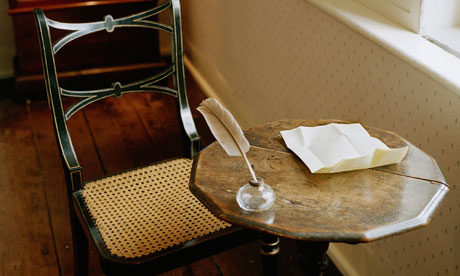
Can the greatest fiction be medicine for the psyche? Paula Byrne, author of The Real Jane Austen: A Life in Small Things, told the Daily Telegraph this week that Austen's novels were prescribed to shell shock victims of the first world war. The claim was first made in a letter written to the Times Literary Supplement in 1984 by the clergyman Martin Jarrett-Kerr, who said that his former Oxford tutor HFB Brett-Smith had been employed by military hospitals to advise on reading matter for the war-wounded. "For the severely shell shocked he selected Jane Austen."
It is impossible not to speculate as to his reasons for thinking Austen the best solace for those who were severely traumatised. Dr Byrne said that if readers found Austen "a comfort" it might be because she described a world where "everyone knew their place". She suggested that "Austen was loved for the same reason audiences were fond of Downton Abbey". In a "crazy world", she provided regularity and social stability.
The notion that Austen's fiction might take you to a better place is an old one. Many will know Kipling's short story "The Janeites", describing the experiences of Humberstall, a soldier in the artillery on the western front, who finds that there is a secret society of men from all ranks who revere Austen's novels. Humberstall himself is converted, subsequently christening his guns by the names of some of her more horrible characters (Mr Collins, General Tilney and "The Lady Catherine de Bugg"). The terrors of war teach him that "there's no one to touch Jane when you're in a tight place".
But is it because she describes blessed order and conformity? Most of Austen's admirers regard her as the most unflinchingly satirical of all great novelists. The snobs and arrivistes of her England are remorselessly skewered; every aristocrat is a buffoon or a monster. Kipling's protagonist certainly notices all the bad behaviour revealed in Austen's novels. "Some'ow Jane put it down all so naked it made you ashamed." Perhaps Brett-Smith was thinking instead of the healing powers of great comedy and the deeper order of beautiful sentences. Comforting, but not comfortable.

